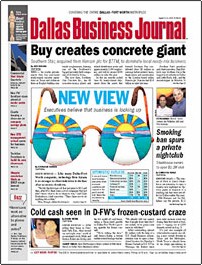| From
the August 8, 2003 print edition
New View
Executives believe that business is looking
up
Stephanie
Patrick Staff Writer
 Like
many Dallas-Fort Worth companies, technology
firm Atrana is no stranger to client indecision
in the face of an economic slowdown. Like
many Dallas-Fort Worth companies, technology
firm Atrana is no stranger to client indecision
in the face of an economic slowdown.
"We felt the first signs
of that just prior to 9/11 and then, after 9/11,
there were a lot of companies that just didn't
know what to do or where to turn," said
Salah Boukadoum, chief executive. "They
chose not to do anything for a while."
Now, though, orders for Atrana's
point-of-sale software are up, and the 8-year-old
Dallas company is increasing its sales and marketing
efforts.
"Our plans are to hire
18 people this quarter," Boukadoum said.
"We are almost doubling the size of the
business."
Boukadoum isn't alone in his
optimism. Nearly three-fourths of executives,
including those at some of the nation's largest
companies, believe economic conditions will
improve in the last half of the year, according
to a just-released
survey by Dallas-based executive consulting
firm Randall James Monroe Inc. That's up from
61% in a January report.
Professional services executives
were the most optimistic, with 88% responding
that business conditions will improve. Health
care and software/IT also showed signs of significant
optimism.
"Improving stock market
conditions and the end of the war were among
the reasons cited for the positive outlook,"
said Randall Neal, RJM's chief executive, whose
clients have included General Motors and Burlington
Northern Santa Fe Railroad. Executives are positive,
but cautious.
Bernard DiFiore only recently
acknowledged that the increase in business he
saw as early as February is a trend. As CEO
of privately held BenefitMall, a leading provider
of products and services for brokers selling
small-group employee benefits, he watched business
drop significantly last year as the small businesses
his company caters to cut both employees and
their health care benefits.
In response, Dallas-based BenefitMall
shrunk its own work force by 10%, laying off
executives, sales personnel and customer service
employees.
After spending more than a year focusing on
its IT offerings and reorganizing its staff,
the company is preparing to unveil new products
in the next few months, and sales are up 15%
over expectations. BenefitMall also is considering
adding three or four markets to its roster of
21.
"There does seem to be
more happening, although it is a slow process,"
said DiFiore, who recently hired a few salespeople
and corporate support personnel. "I would
suspect that we, as well as other companies,
will begin building back our senior teams by
the end of the first quarter (of 2004).
"If this pace continues, we should have
a very good year and continue to be strong next
year."
'Bloodletting
has stopped'
Even so, the economy remains
shaky, and hiring tends to be a lagging indicator
of recovery.
National figures released Aug.
1 show the unemployment rate was down two-tenths
of a percent in July from 6.4% the month before.
However, much of the drop has been attributed
to a contraction of the labor force by 556,000
people.
Goods production and manufacturing jobs took
the greatest hit, cutting a total of 138,000
jobs.
To jump-start the economy,
the U.S. Treasury last month started mailing
25 million child-tax-credit checks as part of
a tax-cut bill recently signed by President
Bush.
"Strong businesses need
to hire workers, but businesses don't get strong
because they hire workers," said Don Hicks,
an economist at the University of Texas at Dallas.
"It's going to take a while to metabolize
all that has happened to the economy."
Hicks expects more consolidation
to occur, particularly in the technology sector,
because companies and investors are less likely
to take chances, but they will spend for capital
investment. The expenditure will increase business
in the short term, he said, but will not lead
a recovery.
The RJM survey found that
only 28% of the 205 executives surveyed expected
hiring to increase in the next six months. That's
a 4% increase over the previous period.
"It's probably going
to be either this fall or early 2004 before
we are going to see significant increases in
hiring," Neal said.
Others say it could be longer.
"The bloodletting has
stopped, but people in jobs today are part of
the critical job-based hiring and aren't likely
to be laid off," said Jeff Kaye, president
and CEO of the Plano-based recruiting firm Kaye/Bassman
International. "Companies will always do
that hiring, but what we are now beginning to
see are companies going outside the critical-only
hiring. There's a slight uptick in hiring when
an organization gets back into expansion mode,
not just cost-cutting."
Kaye said it's likely to be
2005 before there will be a "candidate-driven"
market that job seekers enjoyed just a few years
ago. However, Kaye is noticing more executives
being hired by consulting firms, as well as
more interest in professionals with backgrounds
in insurance marketing and construction.
Even those that flourished
in the down economy have noticed a change and
are responding.
Privately held Interstate Batteries
plans to hire 10 to 15 people for sales, marketing
and operations positions regionally. The Dallas-based
company, which has 1,100 employees nationwide,
including 450 at its corporate headquarters
in the Park Central area, also will hire for
accounting positions and IT.
"Six months ago all the
discussions companies had were about what could
be cut. Now it's, 'How can we grow and expand?'
" said Walt Holmes, Interstate Batteries'
vice president of human resources.
Contact DBJ writer Stephanie
Patrick at spatrick@bizjournals.com or (214)
706-7121.
Click
here to return to Pressroom for Randall James
Monroe, Inc.
|